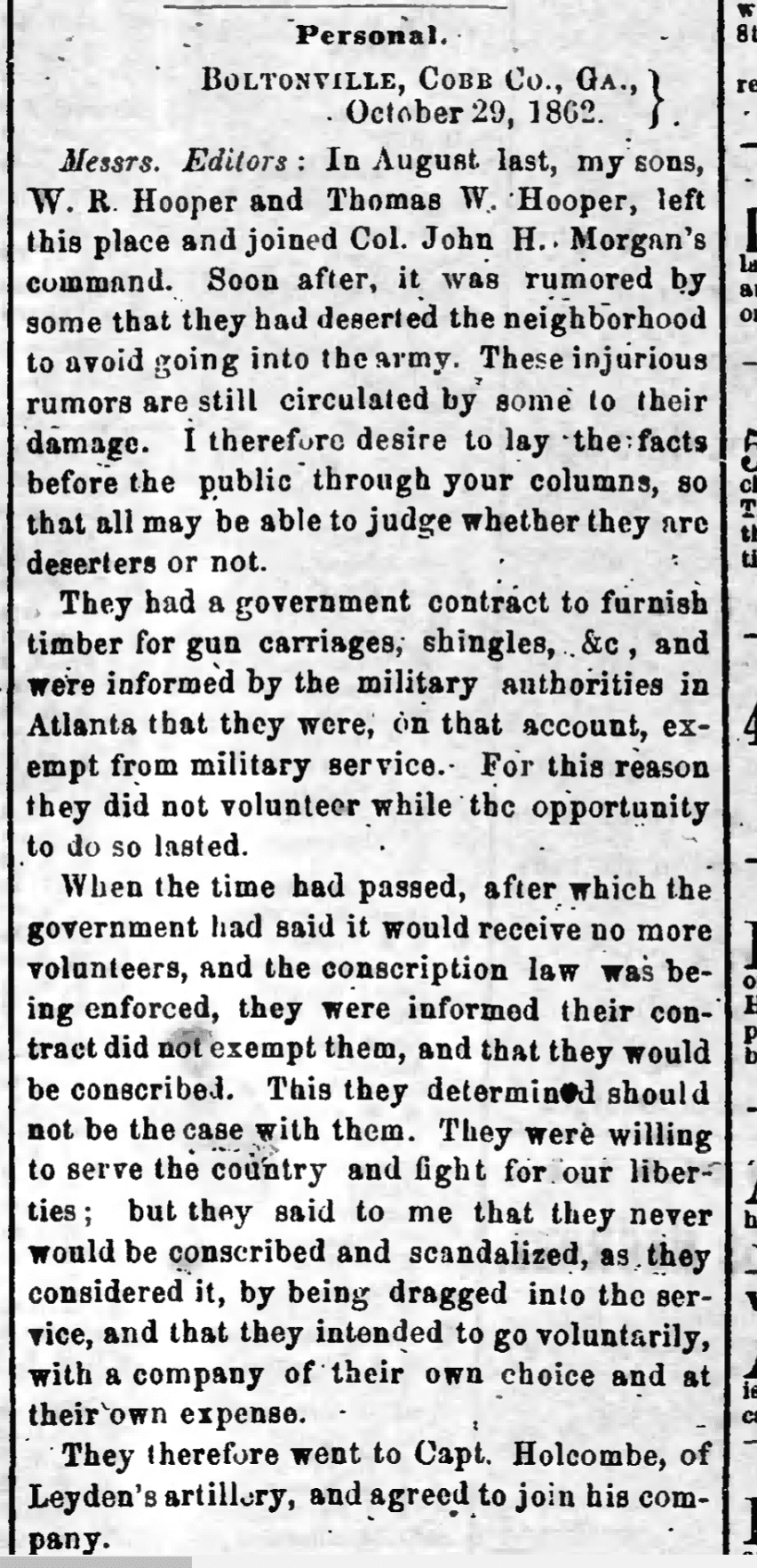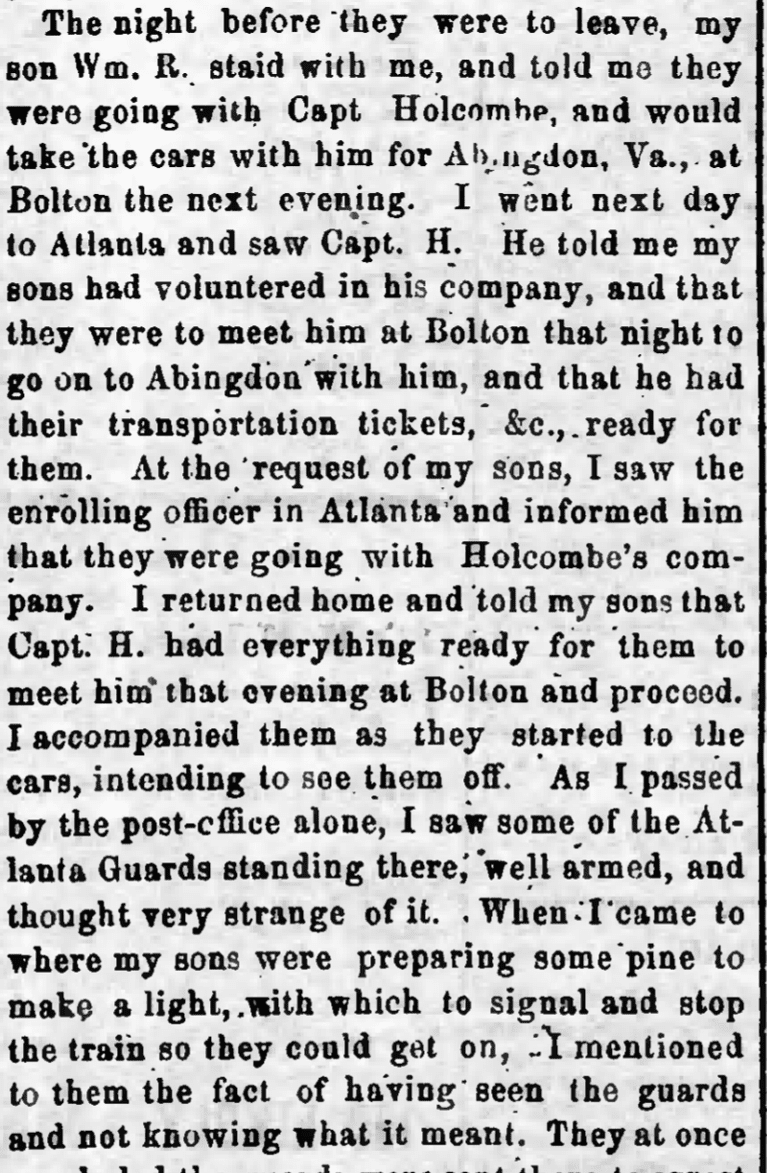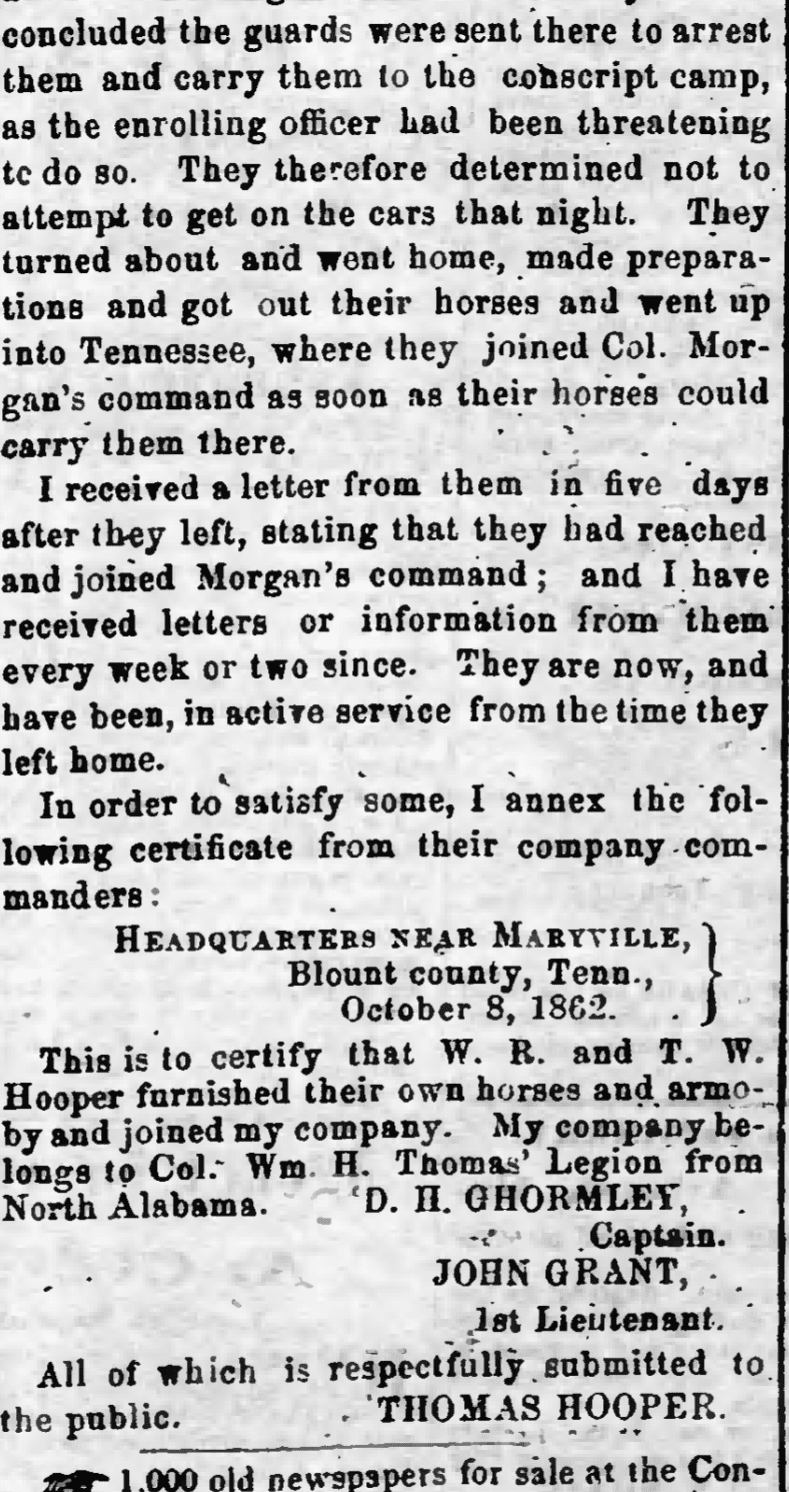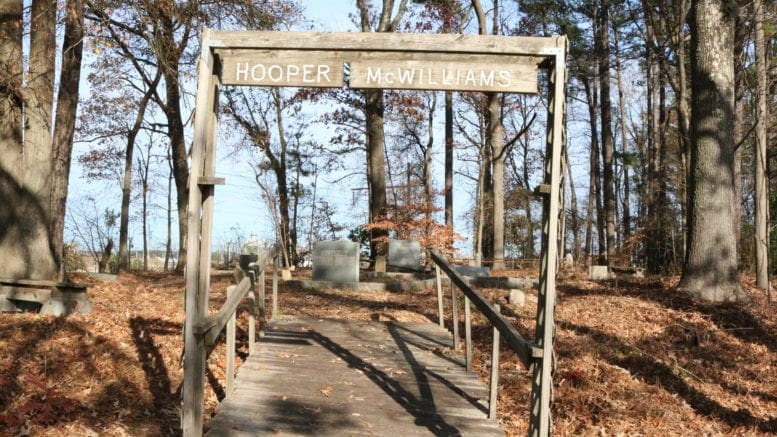This is an expanded republication of an article originally published by the Courier on January 1, 2017. There is a second part to this article, in which an authority on local gravesites proposed a possible solution to the mystery. We’ll publish it tomorrow.
The Hooper family was prominent in the early history of a part of the River Line Historic Area bounded roughly by the Chattahoochee River, and the modern locations of Atlanta Road, Veteran’s Memorial, and (to the north) Oakdale Road.
The southern part of that area, adjacent to the river, contained an incorporated Cobb County town known as Boltonville. Boltonville had mayors (the first was John Collins), postmasters, and a rail stop.
The small Hooper-McWilliams family cemetery was created on the property of Thomas Hooper. The first known burial there was of the infant Christian Hooper in 1836. Several members of the Hooper family and their extended family were buried there, including family patriarch Thomas Hooper (b. 1802) and his sons William H. Hooper and Thomas M. Hooper.
So what’s the mystery I mentioned in the title? On November 2, 1862 an Atlanta-based newspaper called the Southern Confederacy printed a personal statement from a man named Thomas Hooper, sent to the paper from Boltonville. I’ve included the text plus a reproduction of the article at the bottom of this story so you can read the entire account.
He stated that his sons had been accused of draft evasion, and he wanted to set the record straight. The article said that a rumor had circulated in the community that his sons, William R. and Thomas W. had deserted the area to avoid conscription, but that the rumor sprang from a misunderstanding.
The sons had a government contract to provide timber for the Confederate army, and assumed they were exempt for the duration of the contract.
When a conscription notice arrived, they wanted to be able to choose their own terms of service, as volunteers, not forcibly conscripted as draft evaders. so they joined Leyden’s artillery. But when they arrived in Atlanta to report for duty, there were armed militia present. Fearing arrest, and the humiliating forced conscription they were trying to avoid, they fled to Tennessee, where they joined a command from North Alabama.
Thomas Hooper included the text of a note from the captain of the unit his sons had joined as evidence they had joined the Confederate army.
So what is the mystery? The Thomas Hooper who is buried at the Hooper-McWilliams cemetery had sons named Thomas M. and William Harrison Hooper. The article describes the sons as Thomas W. and William R. Yet both sets of Hoopers lived in or near Boltonville, the Hooper sons buried in the cemetery would have been the right age to be drafted, and the community was sparsely populated.
There are three possibilities. There could have been two different sets of Hoopers, of about the same ages and first names. The newspapers could have gotten the initials wrong. Or modern sources like Find-a-Grave (which is where I got the alternative initials) could have inaccurate information. If I find the answer I’ll print a follow-up article, and if any descendants of the Hoopers read this and know the answer, please get in touch.
Below I’ve included the text of the original letter from Hooper, followed by the page image of the original newspaper article:
Text
“Boltonville, Cobb Co., Ga., October 29, 1862. Messrs. Editors: In August, last, my sons, W.R. Hooper and Thomas W. Hooper, left this place and joined Col. John H. Morgan’s command. Soon after, it was rumored by some that they had deserted the neighborhood to avoid going into the army. These injurious rumors are still circulated by some to their damage. I therefore desire to lay the facts before the public through your columns, so that all may be able to judge whether they are deserters or not.
“They had a government contract to furnish timber for gun carriages, shingles, etc., and were informed by the military authorities in Atlanta that they were, on that account, exempt from military service. For this reason, they did not volunteer while the opportunity to do so lasted.
“When the time had passed, after which the government had said it would receive no more volunteers, and the conscription law was being enforced, they were informed their contract did not exempt them, and that they would be conscripted. This they determined should not be the case with them. They were willing to serve the country and fight for our liberties; but they said to me that they never would be conscripted and scandalized, as they considered it, by being dragged into the service, and that they intended to go voluntarily, with a company of their own choice and at their own expense.
“They, therefore, went to Capt. Holcombe, of Leyden’s artillery, and agreed to join his company. The night before they were to leave, my son Wm. R stayed with me, and told me they were going with Capt. Holcombe, and would take the cars with him for Abingdon, Va., at Bolton the next evening. I went next day to Atlanta and saw Capt. H. He told me my sons had volunteered in his company, and that they were to meet him at Bolton that night to go on to Abingdon with him, and that he had their transportation tickets, etc., ready for them.
“At the request of my sons, I saw the enrolling officer in Atlanta and informed him that they were going with Holcombe’s company. I returned home and told my sons that Capt. H. had everything ready for them to meet him that evening at Bolton and proceed. I accompanied them as they started to the cars, intending to see them off. As I passed by the post office alone, I saw some of the Atlanta Guards standing there, well-armed, and thought it very strange.
“When I came to where my sons were preparing some pine to make a light, with which to signal and stop the train so they could get on, I mentioned to them the fact of having seen the guards and not knowing what it meant. They at once concluded the guards were sent there to arrest them and carry them to the conscript camp, as the enrolling officer had been threatening to do so. They, therefore, determined not to attempt to get on the cars that night. They turned about and went home, made preparations and got out their horses and went up into Tennessee, where they joined Col. Morgan’s command as soon as their horses could carry them there.
“I received a letter from them five days after they left, stating that they had reached and joined Morgan’s command; and I have received letters or information from them every week or two since. They are now, and have been, in active service from the time they left home.
“In order to satisfy some, I annex the following certificate from their company commanders:
“Headquarters near Maryville, Blount county, Tenn., October 8, 1862. This is to certify that W.R. and T.W. Hooper furnished their own horses and arms and joined my company. My company belongs to Col. Wm. Thomas’ Legion from North Alabama.
“D.H. Ghormley, Captain. John Grant, 1st Lieutenant.
“All of which is respectfully submitted to the public.
“Thomas Hooper.”
Here is the image of the original article, broken into three sections.




Re: Civil War Mystery: My great, great grandfather was Thomas Hooper 1802. He had a brother, Enoch, who had sons William R. and Thomas W. It is possible Enoch’s middle name was Thomas!!! My tree is public,(HOOPER Family Tree)with many sources if you care to check it out. I can add you to my visitors. Good luck, Janet Hooper Steppick